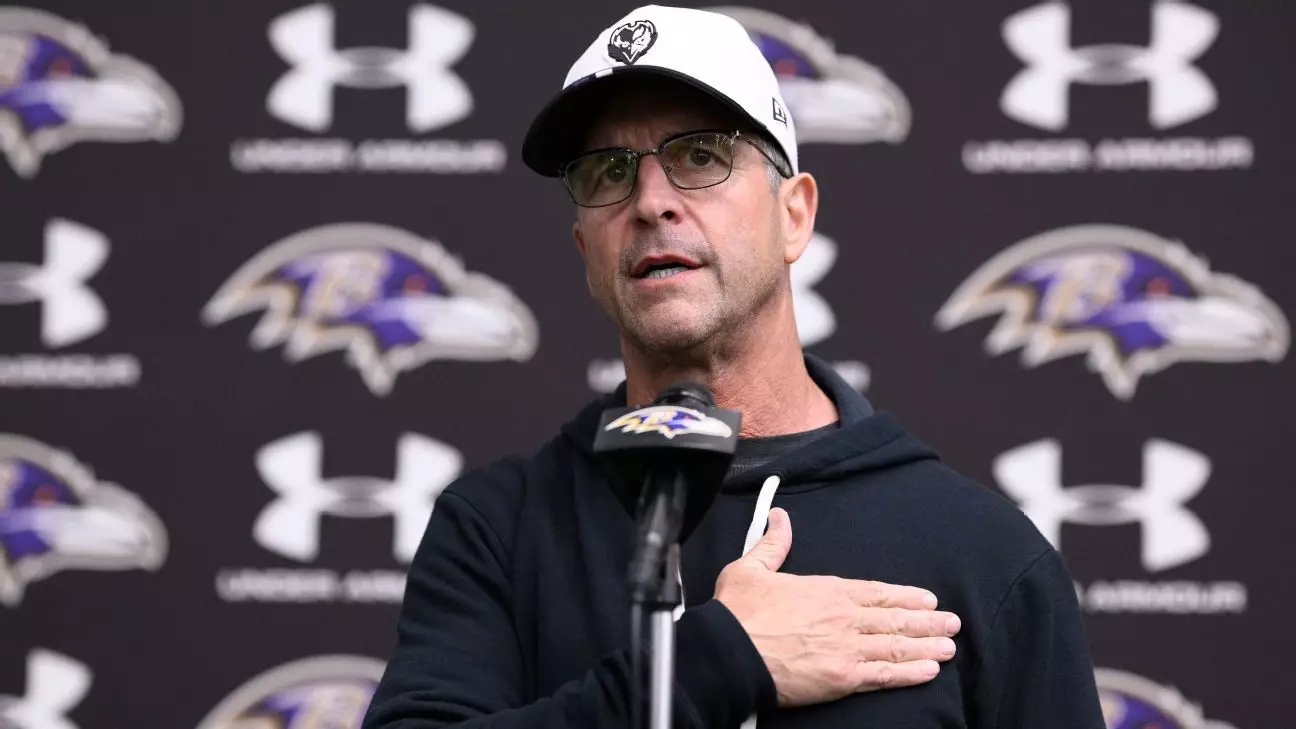The recent release of veteran kicker Justin Tucker by the Baltimore Ravens marks a tumultuous turning point in a franchise known for its resilience and competitive edge. Head coach John Harbaugh approached the media following this unprecedented move, revealing that the decision was far from straightforward. In integrating the insights of team owner Steve Bisciotti, president Sashi Brown, and general manager Eric DeCosta, Harbaugh articulated the weight of a choice that was steeped in complexity and challenges. To the discerning eye, this decision seems less like an isolated incident and more like a reflection of the broader tumult currently enveloping the NFL.
The shocking nature of Tucker’s release raises eyebrows, particularly given that he is widely regarded as one of the greatest kickers in NFL history. To part ways with someone who has been the iron foot for the franchise evokes questions about both the internal and external pressures influencing the Ravens’ management. As Harbaugh notes, the decision is rooted in a necessity greater than just performance metrics; it encompasses the readiness of the team as they prepare for the upcoming season under unusual and trying circumstances.
The Weight of Allegations
The settlement of Tucker’s career arc is opaque, given the soaring allegations of sexual misconduct lodged against him by multiple massage therapists. These accusations, reportedly emerging from a span of five years, cast a long shadow over his otherwise stellar reputation. Tucker’s vehement denials, labeling the allegations as “unequivocally false,” suggest a fierce grassroots appeal to justice and fidelity. However, when off-field issues intertwine with on-field responsibilities, the implications are monumental—not only for the player but for the integrity of the franchise.
It’s a delicate balance that the Ravens must navigate: protecting their team’s reputation while upholding the principle of fair play and due process. The juxtaposition of selecting a rookie kicker, Tyler Loop, shortly before Tucker’s release adds another layer of intrigue. After thirty years without drafting a kicker, the Baltimore Ravens are seemingly not just thinking about the present season, but cleverly strategizing their future as well.
The Football Decision Paradox
Harbaugh’s emphasis on the decision being termed a “football decision” raises philosophical questions about what constitutes such a term in today’s sports landscape. Is performance alone enough to justify a player’s retention, or are ethical considerations equally pivotal? When Harbaugh states, “If it was just a black and white simple thing, then it would be easy to understand,” he taps into the complex realities athletes face that extend beyond the playing field.
Critics may argue that it is almost impossible to disentangle football decisions from ethical issues in a context dominated by public perception. The Ravens’ choice appears to incorporate an understanding of how performance, reputation, and legal ramifications influence the fabric of an organization. The arrival of rookie kickers—who today find themselves embroiled in a competition with aching expectations—implies a daunting potential for failure and an equally amazing chance for growth and triumph.
The Risks of Relying on Rookies
The decision to lean on untested players like Loop and undrafted rookie John Hoyland comes fraught with risks. Harbaugh’s casual analogy, comparing everyday risks to those inherent in team decisions, underscores a broader acceptance of uncertainty. Even a franchise with championship ambitions must recognize that relying on rookies can be akin to gambling in a high-stakes game.
Yet, reliance on new talent can also stir a renaissance of vigor within the locker room. Each fresh face could embody untapped energy and relentless determination, channels for galvanizing an entire team. After all, Tucker himself was drafted as a rookie in 2012 amid mixed expectations, eventually helping lead the Ravens to a Super Bowl win. By placing faith in the potential of newcomers, Harbaugh is not solely abandoning the past but brightening the path ahead.
Culture Shift and Future Implications
Through turbulent times, franchises often have the opportunity to undergo transformative cultural shifts. The Ravens are currently poised at such a junction where they might redefine not only their kicking game but also their broader team ethos. Tucker’s departure could serve as a beacon for reinforcing accountability and establishing a higher standard for behavior, even among its star players.
In navigating these rough waters, the Ravens exhibit a commitment to maintaining their team’s integrity, aiming for preparedness in every facet of the game. While this release undoubtedly sends ripples through the organization, it may also signal the dawn of a new era—reinventing both the expectations of player conduct and the realities of on-field performance. The Ravens’ approach in handling this sensitive situation will remain central to their narrative as they prepare for an intensely competitive league season ahead.


Leave a Reply